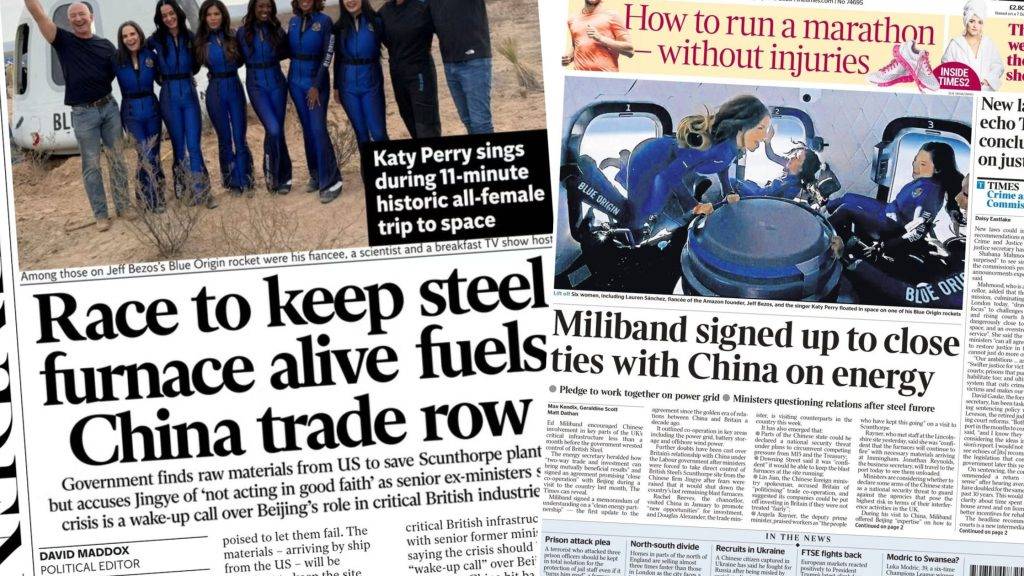Just a few days after the government used emergency powers to take British Steel’s Scunthorpe plant under its control, there are now calls for a review into Chinese investment in UK infrastructure amid claims the Chinese owners intentionally tried to sabotage British Steel to force the UK to depend on Chinese imports instead.
Calls for a review into Chinese investment in UK infrastructure amid British Steel crisis




Senior Labour figures call for review of Chinese investment in UK infrastructure
Explainer: This headline uses formal, authoritative language—“Senior Labour figures” and “call for review”—to lend weight and urgency to the issue. While not overtly sensational, it subtly frames Chinese investment as potentially problematic by implying a need for scrutiny.
- The Guardian reports that senior Labour figures are urging the government to review Chinese investment in UK infrastructure in the wake of the British Steel crisis. The paper says that the figures are warning that a rapprochement with Beijing could risk national security.
Labour backed Chinese investment in critical UK infrastructure
Explainer: This headline uses assertive, matter-of-fact language—“Labour backed”—to suggest clear support, potentially implying poor judgement or controversy. The phrase “critical UK infrastructure” adds weight and seriousness, which may heighten concern or suspicion about the decision.
- The Times reports Ed Miliband is responsible for encouraging Chinese involvement in key parts of the UK’s critical infrastructure less than a month before the government wrested control of British Steel.
China warns UK not to ‘politicise’ trade
Explainer: This headline uses a confrontational tone with the phrase “warns UK,” suggesting tension and authority on China’s part. The use of quotation marks around “politicise” implies scepticism or highlights it as a loaded term, potentially casting doubt on China’s intentions.
- The Telegraph says China has warned the UK against making the situation political. On Monday China’s foreign ministry urged the UK to “treat Chinese businesses that have invested and operate in the UK fairly and justly, (and) protect their legitimate and lawful rights and interests”.
China threatens British jobs over steel sabotage row with Labour
Explainer: This headline uses highly charged language—“threatens British jobs” and “sabotage row”—to create a sense of danger and conflict. The word “threatens” implies aggression, while “sabotage” evokes deliberate harm, both of which sensationalise the issue. By linking the row to Labour, it may introduce political bias, framing the situation as one where Labour’s involvement has escalated tensions with serious consequences.
- The i newspaper reports that Beijing has warned the prime minister that it may cut back investment in the UK after suggestions of malign influence. Foreign ministry spokesman Lin Jian warns Britain to avoid politicising trade cooperation or linking it to security issues so as not to impact the confidence of Chinese enterprises in going to the UK. No 10 appears keen to resist pressure from MPs to review Chinese ownership of critical businesses, the paper adds.
Race to keep steel furnace alive fuels China trade row
Explainer: This headline uses dramatic phrasing—“race to keep steel furnace alive”—to create urgency and tension, suggesting a crisis. The phrase “fuels China trade row” implies that efforts to save the furnace are intensifying an already contentious situation. This framing may introduce bias by portraying the issue as a high-stakes conflict, potentially oversimplifying complex economic and diplomatic dynamics.
- The Independent says the government has found the raw materials from US to save the Scunthorpe plant but accuses Jingye of ‘not acting in good faith’. Senior ex-ministers say the crisis is a wake-up call over China’s role in critical British industries.


